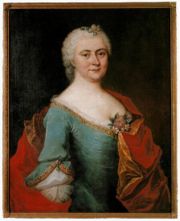
Luise Gottsched
Encyclopedia

Germany
Germany , officially the Federal Republic of Germany , is a federal parliamentary republic in Europe. The country consists of 16 states while the capital and largest city is Berlin. Germany covers an area of 357,021 km2 and has a largely temperate seasonal climate...
poet
Poet
A poet is a person who writes poetry. A poet's work can be literal, meaning that his work is derived from a specific event, or metaphorical, meaning that his work can take on many meanings and forms. Poets have existed since antiquity, in nearly all languages, and have produced works that vary...
, playwright
Playwright
A playwright, also called a dramatist, is a person who writes plays.The term is not a variant spelling of "playwrite", but something quite distinct: the word wright is an archaic English term for a craftsman or builder...
, essayist, and translator
Translation
Translation is the communication of the meaning of a source-language text by means of an equivalent target-language text. Whereas interpreting undoubtedly antedates writing, translation began only after the appearance of written literature; there exist partial translations of the Sumerian Epic of...
, and is often considered one of the founders of modern German theatrical comedy.
Biography
She was born in Danzig (GdańskGdansk
Gdańsk is a Polish city on the Baltic coast, at the centre of the country's fourth-largest metropolitan area.The city lies on the southern edge of Gdańsk Bay , in a conurbation with the city of Gdynia, spa town of Sopot, and suburban communities, which together form a metropolitan area called the...
), Poland
Poland
Poland , officially the Republic of Poland , is a country in Central Europe bordered by Germany to the west; the Czech Republic and Slovakia to the south; Ukraine, Belarus and Lithuania to the east; and the Baltic Sea and Kaliningrad Oblast, a Russian exclave, to the north...
. During her lifetime, she was considered one of Europe
Europe
Europe is, by convention, one of the world's seven continents. Comprising the westernmost peninsula of Eurasia, Europe is generally 'divided' from Asia to its east by the watershed divides of the Ural and Caucasus Mountains, the Ural River, the Caspian and Black Seas, and the waterways connecting...
's leading intellects and one of the most intelligent women of the time. She became acquainted with her husband, the poet and author Johann Christoph Gottsched
Johann Christoph Gottsched
Johann Christoph Gottsched was a German author and critic.-Biography:He was born at Juditten near Königsberg, Brandenburg-Prussia, the son of a Lutheran clergyman...
, when she sent him some of her own works. He apparently was impressed, and a long correspondence eventually led to marriage. After marriage, Luise continued to write and publish, and was also her husband's faithful helper in his literary labours.
Works
She wrote several popular comediesComedy
Comedy , as a popular meaning, is any humorous discourse or work generally intended to amuse by creating laughter, especially in television, film, and stand-up comedy. This must be carefully distinguished from its academic definition, namely the comic theatre, whose Western origins are found in...
, of which Das Testament is the best, and translated The Spectator
The Spectator (1711)
The Spectator was a daily publication of 1711–12, founded by Joseph Addison and Richard Steele in England after they met at Charterhouse School. Eustace Budgell, a cousin of Addison's, also contributed to the publication. Each 'paper', or 'number', was approximately 2,500 words long, and the...
(9 volumes, 1739–1743), Alexander Pope
Alexander Pope
Alexander Pope was an 18th-century English poet, best known for his satirical verse and for his translation of Homer. He is the third-most frequently quoted writer in The Oxford Dictionary of Quotations, after Shakespeare and Tennyson...
's Rape of the Lock (1744) and other English and French works. After her death her husband edited her Sämtliche kleinere Gedichte with a memoir (1763).

